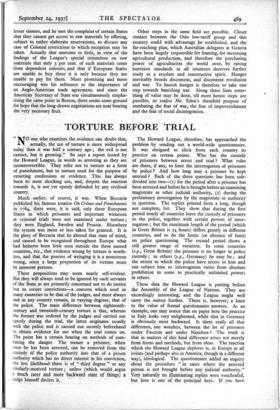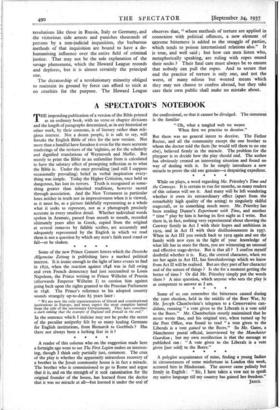TORTURE BEFORE TRIAL
"No one who, examines the evidence can doubt that, actually, the use of torture is more widespread today than it was half a century ago ; the evil is not extinct, but is growing." So says a report issued by the Howard League, in words as arresting as they are incontrovertible. They refer not to torture as a form of punishment, but to torture used for the purpose of extorting confessions or evidence. This has always been its most shocking use, and, despite the reaction towards it, is not yet openly defended by any civilised country.
Much earlier, of course, it was. When Beccaria published his famous treatise On Crimes and Punishments in 1764, there were, it is said, only three European States in which prisoners and important witnesses at criminal trials were not examined under torture ; they were England, Sweden and Prussia. Elsewhere the system was more or less taken for granted. It is the glory of Beccaria that he altered that state of mind, and caused to be recognised throughout Europe what had hitherto been little seen outside the three named countries, viz., that evidence wrung by torture is worth- less, and that the process of wringing it is a monstrous wrong, since a large proportion of its victims must be innocent persons.
These propositions may seem nearly self-evident. But they, will always tend to be ignored by such servants of the State as are primarily concerned not to do justice but to secure convictions—a concern which used in many countries to be that of the judges, and must always and in any country remain, in varying degrees, that of the police. The main difference between eighteenth- century and twentieth-century torture is that, whereas the former was ordered by the judges and carried out openly during the trial, the latter _ originates usually with the police and is carried out secretly beforehand to obtain evidence for use when the trial comes on. The point has a certain bearing on methods of com- bating the danger. The sooner- a prisoner; when once he has been arrested, can be removed from the custody of the poliCe authority into that of a prison authority which has no direct interest in his conviction, the less likelihood there is of " third degree " or any similarly-motived torture ; unless (which would argue a much rarer and more backward state of things) a judge himself desires it. The Howard League, therefore, has approached the problem by sending out a world-wide questionnaire. It was designed to elicit from each country its practice on certain points. Who has the custody of prisoners between arrest and trial ? What rules are there, if any, to limit the interrogation of prisoners by police ? And how long may a prisoner be kept untried ? Each of the three questions has been sub- divided into two—(I) for the period after a prisoner has been arrested and before he is brought before an examining magistrate or other judicial authority, (2) during the preliminary investigation by the magistrate or authority in question. The replies printed form a long, though not complete, list. They show that during the first period nearly all countries leave the custody of prisoners to the police, together with certain powers of inter- rogation ; but the maximum length of the period (which in Great Britain is 24 hours) differs greatly in different countries, and so do the limits (or absence of limit) on police questioning. The second period shows a still greater range of variation. In some countries (e.g., Great Britain) the prisoner is no longer in police custody ; in others (e.g., Germany) he may be ; and the extent to which the police have access to him and can subject him to interrogation varies from absolute prohibition in some to practically unlimited powers in others.
These data the Howard League is putting before the Assembly of the League of Nations. They are exceedingly interesting, and the League might well carry the matter further. There is, however, a limit to the value of formal questionnaire answers. As an example, one may notice that on paper here the practice in Italy looks very enlightened, while that in Germany is obviously most backward. Is there really all that difference, one wonders, between the lot of prisoners under Fascism and under Nazidom ? The truth is that in matters of this kind difference arises not merely from forms and methods, but from ideas. The reaction which the Howard League deplores is, in Europe at all events (and perhaps also in America, though in a different way), ideological. The questionnaire added an inquiry about the procedure " in cases where the arrested person is not brought before any judicial authority." Very naturally no illuminating replies were vouchsafed, but here is one of the principal keys. If you have revolutions like those in Russia, Italy or Germany, and the victorious side arrests and punishes thousands of persons by a non-judicial inquisition, the barbarous methods of that inquisition are bound to have a de- humanising influence over the entire field of criminal justice. That may not be the sole explanation of the savage phenomena, which the Howard League records and deplores, but it is almost certainly the principal one.
The dictatorship of a revolutionary minority obliged to maintain its ground by force can afford to stick at no cruelties for the purpose. The Howard League observes that, " where methods of torture are applied in connexion with political offences, a new element of e,xtreme bitterness is added to the struggle of parties, which tends to poison international relations also." It is true, and well said ; but how can men listen who, metaphorically speaking, are ruling with ropes round their necks ? Their final care must always be to ensure that nobody can pull the ropes. And to secure that end the practice of torture is only one, and not the worst, of many odious but wonted means which they may not choose to confess abroad, but they take care their own public shall make no mistake about.



















































 Previous page
Previous page